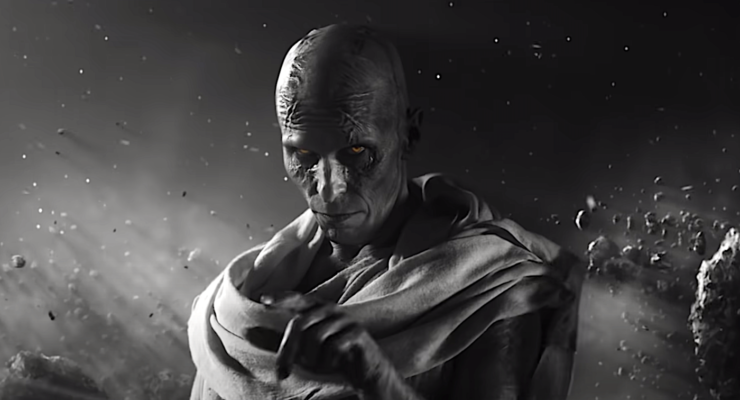In 1990, Lou Reed and John Cale collaborated for the first time in decades. After vowing never to work together again after the trenches of the Velvet Underground, they spoke for the first time in decades at Andy Warhol’s 1987 memorial, where the painter Julian Schnabel suggested they work on a tribute to Warhol. This eventually resulted in Songs for Drella, an album that is mostly loving, but occasionally shot through with a bit of venom directed at their old friend and album producer. (tbf, Warhol probably deserved it.) One of the best songs on the album is titled “Work”, and includes the line:
Andy was a Catholic, the ethic ran through his bones
He lived alone with his mother, collecting gossip and toys
Every Sunday when he went to church
He’d kneel in his pew and he’d say, “It’s just work…
All that matters is work.”
I found myself thinking about that a few times during Thor: Love and Thunder. I didn’t expect the film to get too much into ideas about religion, because it’s a Marvel movie and I don’t expect it too get too far into the ideas about anything. But I was pleasantly surprised by what it did with what it would mean to attack and dethrone gods.
Spoilers ahead for Thor: Love and Thunder.
One of the things that’s interested me for years about the MCU and the DCU is watching how they bring the comics’ enthusiastic mix of “real world” and “fantasy world” into their films—especially as the films have grown in popularity to the point of becoming our default pop culture.
What I’m interested in is how the treatment has evolved. 1978’s Superman didn’t grapple with whether Supes replaced Jesus in the American imagination—but Bryan Singer’s Superman Returns kinda did, and the DCU films very much do. Tim Burton’s Batman didn’t play with religious imagery, but Matt Reeves’ The Batman made emotional hay from using Ave Maria as a musical motif. Back in the early ‘00s, the Spider-Man and X-Men movies dealt explicitly with mainstream, Western Christianity. The (presumably Protestant) Aunt May prays at her bedside, and Nightcrawler is a practicing Catholic—and in both cases these real world religious impulses sit side-by-side with the reality of superheroes, without people questioning how superpowers would affect peoples’ belief systems.
One of the things I’ve been interested in is how the sudden influx of uncanny shit would affect people on the ground, and over the last decade the Marvel Cinematic Universe has done the most work with how the appearance of superheroes affects day-to-day life, including people’s spiritual lives. The early MCU features a world that most people on our Earth would recognize as “normal”—people have jobs and families and some of them are religious and some of them aren’t. There are wars supplied by Stark Industries, there are normal human spies like Natasha Romanoff and Clint Barton, physicists like Jane Foster and Eric Selvig, good-hearted white-collar criminals like Scott Lang.
OK, that one’s not so normal in our world.
And yes, the Ancient One and her various followers were using magic to protect the world from beings like Dormammu. The people of Ta Lo were keeping the Dark Gate shut to protect our world from Dweller-in-Darkness. Carol Danvers had become Captain Marvel and left to protect the innocent across space. Peter Quill had been whisked off to space by Yondu and his crew, Stick was fighting The Hand, a chemical stew gave a little kid (and four very special turtles) enhanced senses, beings from an alternate dimension were traveling the world in search of the bangle that would take them home, The Eternals were occasionally popping in for a visit, The Watcher was, uh, Watching.
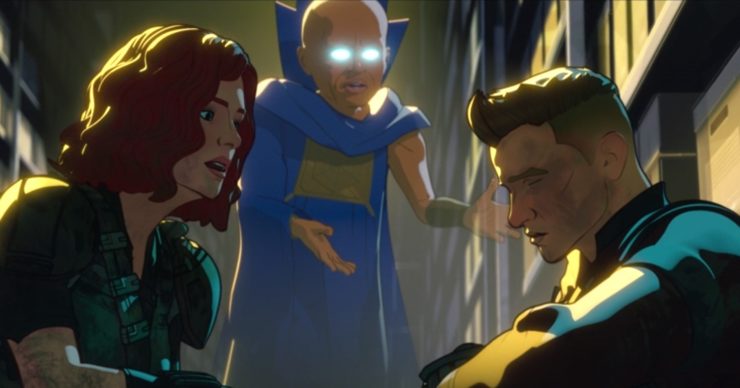
But the thing is, apart from Nick Fury and a few other people who were directly involved in cosmic drama, nobody knew about any of that.
Regular people, like bank tellers and teachers and janitors and grad students and lawyers and homemakers had no idea any of this stuff was happening. From their perspective, the hot billionaire who ran Stark Industries suddenly started flying around in an armored suit. A couple months later a giant green monster destroyed Harlem, and a god from the Norse mythology (a) turned out to be real and (b) started dating one of the U.S.’s top astrophysicists.
THEN aliens invaded New York.
THEN they found out a famous WWII super soldier was brought back from the dead.
And after that superheroes, supervillains, and practicing magicians began cropping up all over the world. They became celebrities. People made movies and documentaries and even Broadway musicals about them. People discovered that there was an entire secret nation in Africa. Half of Earth’s population seemingly died and came back. And after THAT a whole ship full of Asgardians—again, creatures from myth—show up as refugees, move into a seaside village in Norway, and embark on a robust tourism campaign to fund their new lives on Earth.
In the MCU this has all happened over the course of about 15 years.
In Ms. Marvel, Kamala Khan is a practicing Muslim with superpowers. Her superpowers might be connected to the djinn, a mythological race that was actually folded into Islam’s worldview. Her superpowers and her belief system can easily complement each other. In Moon Knight, Marc Spector is a practicing Jew with superpowers and a strong connection to the pantheon of Ancient Egypt—which is real—but the fact that he’s met Egyptian gods doesn’t cancel out his choice to hang a mezuzah on his doorframe. In Daredevil, Matt Murdock’s relationship to Catholicism gets its own arc, even as he knows that Thor’s a real dude. Doctor Strange’s first solo film is about a person having his materialism challenged by the idea that a vaguely Tibetan Buddhist-ish magic is real, and having to change his worldview to allow for that. The tension of this new reality runs through a lot of the MCU, and was set up nicely in conversation in The Avengers:
Natasha: “I’d sit this one out, Cap. These guys come from legend—they’re basically gods.”
Steve: “There’s only one god, ma’am. And I’m pretty sure he doesn’t dress like that.”
Which, we know that isn’t true. By the end of the movie, Cap knows that isn’t true. Which can allow the MCU stories to ask some interesting questions about what gods are and what they’re for. While Thor: Love and Thunder didn’t entirely work for me (I’m pretty sure my beloved colleague Emmett likes it more than I did), I think its treatment of this idea is the best the MCU has come up with yet, because in the midst of all the silliness and screaming goats, it treats the core idea of faith surprisingly seriously.
In Thor: Love and Thunder the first thing we see is Gorr, Future God Butcher, begging his god, Rapu, to save his daughter’s life. His prayer is either ignored or the answer is “No”, and his daughter dies. But wait! A voice calls to him, and when he looks up he sees a beautiful garden shimmering on the horizon. He crawls to it, and finds shade, water, fruit to eat…and his god, Rapu. Has he died? Is this some sort of paradise? Is his god about to reward his steadfast faith by reuniting him with his daughter in paradise?
Nope.
In short order Gorr learns that Rapu doesn’t care about his followers, there is no eternal reward waiting for any of them, and the feast Gorr’s stumbled upon isn’t for him—it’s celebrating Rapu’s victory over a warrior who attempted to kill him with the mighty, cursed weapon called the Necrosword, the only weapon that can kill a god.
Maybe not the best thing to tell a grieving father who just learned that he’s never going to see his daughter again.
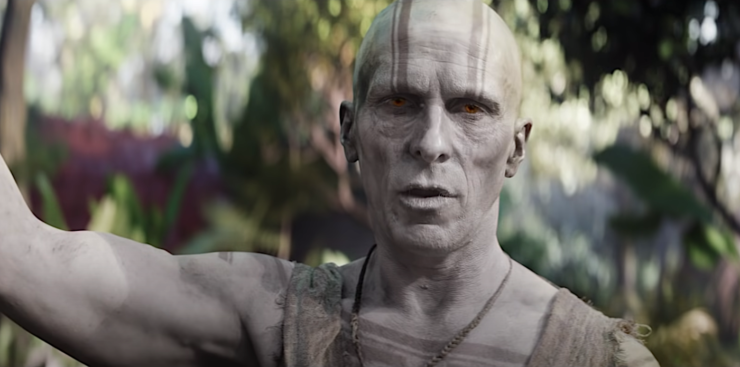
Because here’s the thing—the “No” didn’t matter. Gorr wasn’t angry with Rapu for allowing his daughter to die. What he’s angry about, and why he becomes The God Butcher, is that Rapu mocks the horror of his daughter’s death, and scoffs at Gorr’s belief in an eternal reward. Gorr has gone, in a few seconds, from believing that his daughter is in some kind of paradise, to learning that she isn’t and that the god he’s been worshiping thinks it’s ridiculous that Gorr wants that for her. Suddenly the Necrosword is in Gorr’s hand and through Rapu’s throat. And while it may have only been Gorr’s intention to slay the one shitty god, the sword’s curse soon takes him over and sets him on a godkilling quest.
The movie has an openly anti-god agenda. Even our hero doesn’t want to be an active god anymore. Thor wants to find a place to be calm and meditate to try to work out some of his trauma, but each time he leaves he gets called back into a “classic Thor adventure”—i.e. answering someone’s prayer. Because what else is he doing when he works with the Avengers to defeat Thanos and bring all the Snaptured people back? What else is it when he works with the Guardians of the Galaxy to pick a side in a war? In the one battle we see, the one thing that people are asking for is that their sacred temple be saved from marauders. It wasn’t a temple raised to Thor; he’s not their god, but he is the god who heard their pleas and came to help. Thor successfully fends off the interlopers… but destroys the temple in the process.
The people reward Thor with a pair of screaming goats (a somewhat tired internet meme, yes, but also a fun play on sacrificial livestock) because they know they’re supposed to honor the gods, but they’re also pretty pissed off about their temple and need to offload some loud goats. What does it mean when a god you don’t worship answers your prayer, but accidentally destroys your holy site? Especially when your own god didn’t show? What are the gods for? At what point do they become more trouble than their worth?
There are other divine digs dotted through the movie. When Thor goes off to save the children of Asgard, he promises a feast on their return, but specifies that they will not feast on the children, as that was “a dark time”. Once the movie takes us down to Omnipotence City we find that Zeus is more concerned about planning a divine orgy than in helping even fellow gods, let alone mortals—when he talks about humans it’s in cold numerical terms of how many have sacrificed themselves for their respective deities.
And yet the movie keeps coming back to the idea that humans can’t help but reach out to their gods. When Thor and the Guardians bring up distress signals on the screen, what is that other than prayer? Human after human in distress, calling out to any higher power who will hear them. When Thor sees the Lady Sif he goes to her, finds one of the butchered gods, and basically gets his next quest, but not before reminding her that she won’t go to Valhalla unless she dies IN battle, not after it. Which is kind of a funhouse mirror to Gorr’s “no eternal reward” discovery, no? Even Lady Sif, with all of her accomplishments, has to follow the rules of the belief system to the letter if she wants it to pay off.
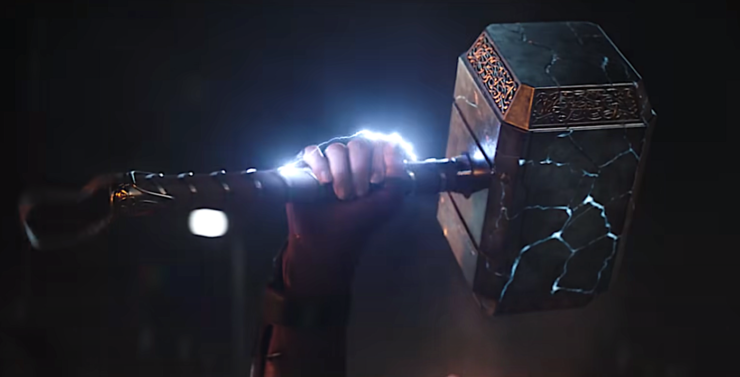
Which brings us to Jane. Jane takes up Mjolnir not to be a mighty hero, but in the hopes that it will heal her cancer. Having exhausted science she turns to magic. Which, in her universe, is demonstrably real (and which, for Asgardians, are one and the same). But Mjolnir can only help for so long, and may actually be sapping her strength by the end. When Thor begs her to stop using it it’s because he’s hoping, against all evidence, that somehow she’ll miraculously heal and he’ll get more time with her. Does this, too, count as prayer? We don’t learn whether it would have worked because she, like so many gods before her, says no. She was able to wield Mjolnir because she was “worthy” but as he makes it clear, Thor only became “worthy” himself because she taught him to protect the helpless. His worthiness didn’t come from godhood—if anything it came from an adoption of humanity. And now she feels that she has to live up to that worthiness by saving the children of Asgard from Gorr. In a movie full of gods, Dr. Jane Foster, human scientist, is the one who acts selflessly to protect the innocent.
A short battle later, Thor is finally confronted with his own death. Gorr has reached Eternity, and is about to wish the gods out of existence. (will that mean Valhalla for Thor?) Rather than plead with Gorr or try to fight him, he starts to walk over to Jane.
When Gorr yells “Don’t turn your back on me” at Thor, I don’t think he’s really speaking to Thor in that moment—he’s speaking more to the idea of a god, the idea that human pain and loss is worthy of attention from something higher and more pure than humanity thinks it can reach. Something that can’t be touched by cancer, or death, or time. Because even his quest to kill all the gods ends in prayer of a kind, doesn’t it? What is the wish to the Eternal other than that? What is the eternal other than yet another higher power, stepping in to pay attention when Gorr’s own god refused?
Which is when Thor proves his worthiness. He doesn’t lash out at Gorr, he tells him that he wants to spend his last moments of existence with the person he loves, and he reminds Gorr that he can use his wish for anything. So he does. Thor holds Jane as she dies; Gorr wishes his daughter back into existence, and as the curse kills him the “God Butcher” spends his last moments praying for Thor to take care of her.
Which brings us back, improbably enough, to Andy Warhol.
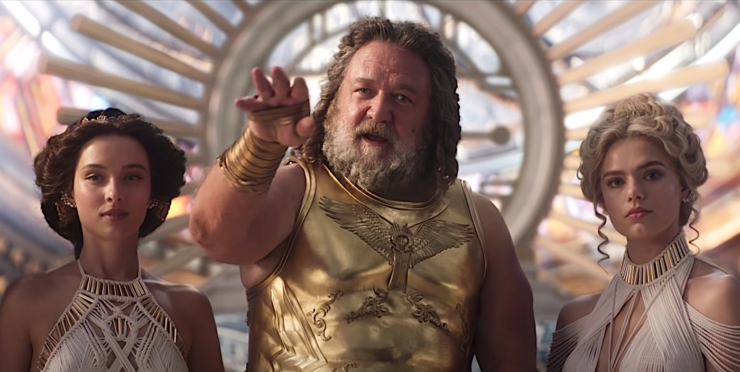
The trip to Omnipotent City shows us that the gods are not worthy of our adulation. Do any of them jump in to help when Thor tries to muster an army? Not even Korg’s Kronan god (who seems like an awesome guy) bothers to stand up and defend his follower. And sure, Dionysus is probably too drunk to move, but Bast? You’re telling me a cat goddess doesn’t want to chase one of those shiny gold guards around like a fallen Christmas ornament? And what about the Maori Goddess? Nothing? Bao, God of Dumplings? Surely Bao could call up a delicious storm of pierogi, shumai, and ravioli to rain down upon Gorr’s head. But no—they’re content to cheer the fighting like it was an entertainment for their benefit. And even leaving aside their refusal to stand with Thor, they don’t help Zeus either. They’re only too happy to applaud his entrance, but no one does jack shit when he’s kebobed with his own thunderbolt.
Something Warhol understood, and tried to communicate to Lou Reed, was that religion was like silkscreening at the Factory, or writing a song, or, hell, like writing an essay: it’s work. You have to be willing to put in the time, follow the rules, learn the words, show up for the 9:30 service. And what I love about Thor: Love and Thunder is that the movie argues that your gods should do that, too. Faced with a desperate, despairing follower, Rapu should have offered solace, not contempt, and when he doesn’t he pays for it. Given an opportunity to help his fellow deities, Zeus should have called up an army for Thor rather than coming back to the orgy again and again, but instead he suffers a humiliating defeat and has to enlist his son to get revenge.
Under all the action and questionable physics and Point Break jokes, Thor’s arc has always been about “worthiness”. What makes a person worthy? Who decides? In the Catholic masses Warhol attended, a central part of Communion is saying you’re not worthy to receive it. (n.b.: Warhol did not.) This functions as both a reference to a specific act of healing in Matthew 8:5-13, and an acknowledgement of humility from the parishioners—it also lobs the worthiness ball into a higher court, as it were. In Thor’s arc the concept is farmed out to a divine hammer enchanted by Odin, but never defined in any concrete way, so the earlier Thor movies were able to keep “worthiness” flexible. In Age of Ultron, Natasha says “That’s a question I don’t need answered”—which makes me think she doesn’t consider herself worthy (even though she totally is), while Steve Rogers attempted and definitely made it move, and in Endgame, and much to Thor’s delight, he was able to call Mjolnir in the fight against Thanos. Here Jane is called by Mjolnir because of love, and this gives her and Thor opportunities to prove their worthiness in far more concrete ways than before. In Thor: Love and Thunder worthiness isn’t about feelings, or noble intentions, or past actions, or divine bloodlines, or, even, dying in battle: the most important thing is work.
When we first re-meet Dr. Jane Foster, sitting for her chemo session, what does she do? She notices a person reading her book, and, learning that he’s confused by it, she talks him through how wormholes work. Chemo’s an exhausting, horrible nightmare to go through, but Jane gathers her strength and seems to get. Real joy from explaining the work she loves. Jane also works at being a hero. She workshops her catchphrases until she finds the right one, thinks through how to face off with a bad guy, and finds a new way to use Mjolnir that uses with its fractures. And when she battles Gorr, she reminds him of her superhero title, but it’s clear the title she’s most proud of, the one that she wants him to remember, is Dr. Jane Foster.
For Thor’s part? After everything Gorr did, he has every right to refuse the man’s request, to answer his prayer with a “No”. Instead, unlike Rapu, Thor treats Gorr’s prayer with the care and respect it deserves, and takes on the work of raising Love alone.
In the end the gods who are worthy of worship are the ones who are willing to work for their followers.
It’s possible that Leah Schnelbach spends too much time meditating on the life of Andy Warhol. Come try to lift the divine hammer with them on Twitter!










